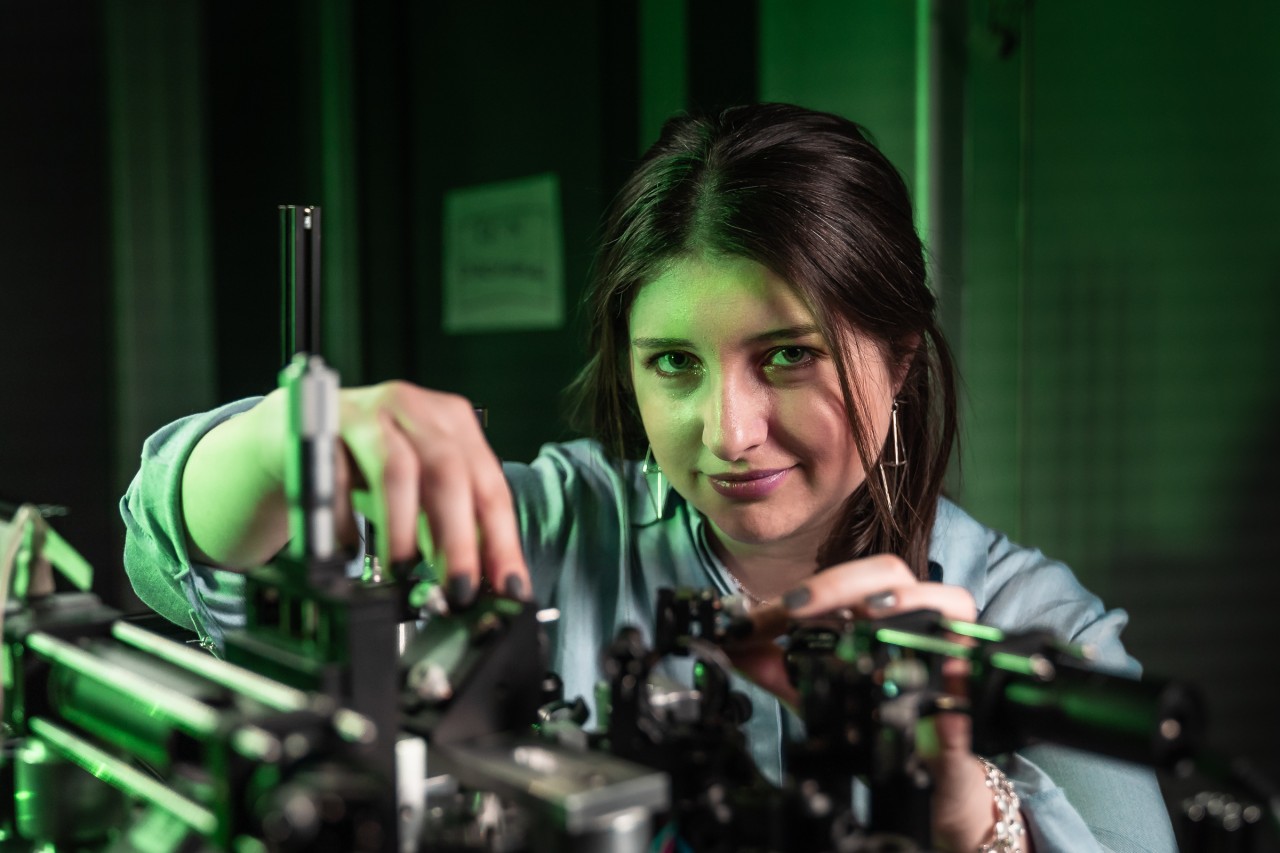Viviana Villafañe | Meet the MCQSTians: they are curious about science and passionate about their research, have diverse careers paths, work in inter-disciplinary teams, and are at the forefront of the second quantum revolution. In this series, we regularly feature members of the MCQST community.
“I believe that humanity is on the verge of a new paradigm.”
Viviana Villafañeis an MCQST Distinguished Postdoc who joined the group of Prof. Dr. Kai Mueller at the Walter Schottky Institute in 2019. We invited Viviana to share her work and her passion for the potential of quantum technologies to shape the future of humanity.
Can you briefly explain your research project?
My research focuses on the engineering of future technological components for quantum communication and quantum key distribution. The research in this area requires a multidisciplinary approach, led by physicists and engineers, who develop physical models and conduct experiments with optical spin control techniques. My current position involves the demonstration of prototype quantum photonic solutions based on, but not limited to, color centers in diamond. Ultimately, my vision is to provide the technological basis for the future quantum internet using hybrid physical interfaces such as vacancies in diamond, 2D materials, and semiconductor quantum dots.

"Here in Munich we have state-of-the-art labs and the access to many collaborations with great scientists working in the same area – this is essential to our daily work."
What does your day-to-day work look like?
Most of my days include discussing and brainstorming ideas with my colleagues and collaborators, and building optical experiments in the laboratories. What I enjoy most is “playing” with the physical systems in the lab and trying to predict how the nature of these systems will interact with our experiments.
What keeps you excited and makes you want to start work in the morning?
I believe that humanity is on the verge of a new paradigm evolving from the information era to the quantum systems era. I feel excited, grateful, and humbled to be part of the team of scientists who are currently driving this revolution. Among the many advantages we expect that future quantum computers will bring are strong developments in chemistry, pharmacology, and secure quantum communications.
What inspired you to become a quantum scientist? Did you always know you wanted to be a scientist?
In high school I discovered a special interest in the natural sciences, though I never envisioned my future as being a quantum physicist. Today, my daily life has surpassed my expectations. It has been a long road from when I started studying and profiling my interests until now. After I finished my PhD, I was certain that I wanted to become a quantum scientist, and this is what brought me to Munich.
What drew you to Munich?
I met Dr. Jonathan Finley at a conference in Buenos Aires. He gave an amazing talk explaining the different areas of research that currently exist at the Walter Schottky Institut. He was very kind and invited me to visit his laboratories here in Munich. Once here, I discovered that Munich is a vibrant city, but more importantly, it is one of the leading centers for doing quantum research. Here in Munich we have state-of-the-art labs and the access to many collaborations with great scientists working in the same area – this is essential to our daily work.
What are the biggest challenges that you’ve faced, and how have you overcome them?
In my opinion, one of the biggest challenges I have faced is acquiring time management skills. A scientist is required to present new and original ideas, write funding projects, direct and nurture the education of young students, and perform novel and exciting experiments. I am always trying to improve my project management skills in order to become a good professional. This is indeed something that I continue to learn every day at work.
What was your most memorable moment or proudest achievement?
One major step in my career was receiving the Distinguished Postdoc Fellowship from MCQST and also being awarded a Seed Funding Project. This was the first time that I could get funds for my own research ideas, and it was definitely a stepping stone for me.
Outside of science, what do you enjoy doing most?
I enjoy spending time with friends and biking in the Englischer Garten. I also like dancing tango and playing video games.
If you weren't a scientist, what do you think you would be doing now?
I would probably be an engineer, doing research in areas in which humanity can access new frontiers: either designing robots for space or new technological components for electronics.
What advice would you give to someone at the beginning of their science career?
I would say that it is important to keep the motivation and curiosity so that you never stop asking questions and learning. Since this job is extremely challenging, I would advise young students to never stop having fun and find time to relax in order to keep bringing original ideas to the field.
Find out more about our
Distinguished Postdoc Fellowship and
Viviana's research.